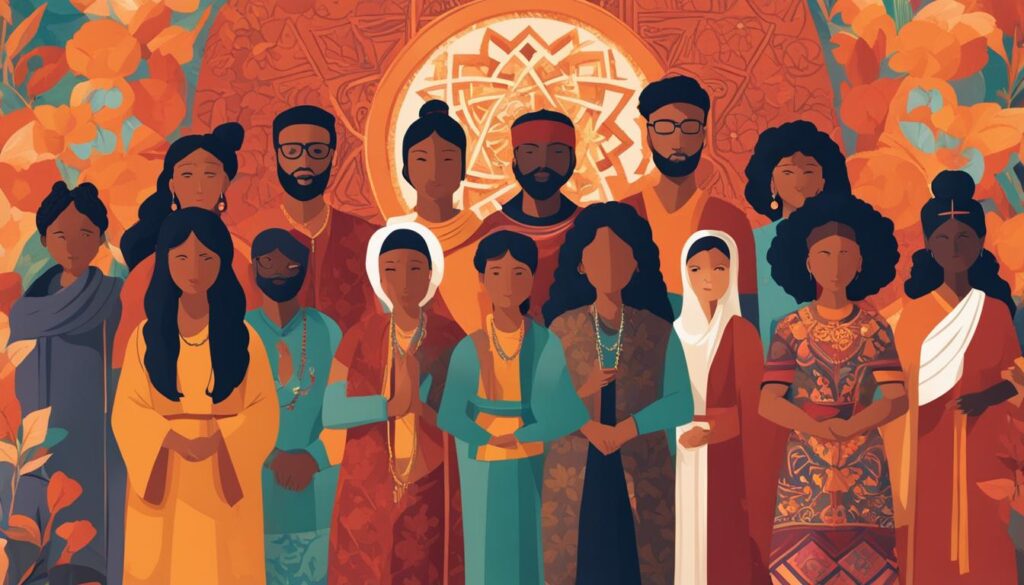Are you looking for tips on how to navigate religious and cultural sensitivities? This article aims to provide you with practical strategies to communicate respectfully and inclusively when engaging in sensitive topics related to culture and religion.
Developing cultural awareness and religious understanding are crucial components of intercultural communication. By acknowledging and respecting diverse perspectives, you can foster greater religious tolerance and cultural inclusion in your conversations and interactions with others.
Throughout this article, we will discuss various tips and techniques for navigating diverse beliefs and practices. We will cover the importance of using inclusive language, developing empathy and active listening skills, addressing stereotypes and misconceptions, and much more. Through these strategies, you can gain a deeper appreciation for cultural differences and communicate with greater sensitivity and insight.
Read on to discover how you can build cultural awareness and religious understanding in your everyday interactions and engagements. What are some tips for navigating religious and cultural sensitivities? Let’s find out together.
Understanding Cultural Sensitivity
Cultural sensitivity refers to the ability to understand, appreciate and respect different cultures. It is essential to gain a deep understanding of diverse cultural backgrounds to communicate effectively and respectfully on sensitive topics such as religion and culture. It involves recognizing and acknowledging diverse perspectives to foster a harmonious and tolerant society.
Intercultural communication is crucial to developing cultural sensitivity. It involves sharing information across different cultures, listening carefully and asking questions to understand others’ perspectives fully. Cultural awareness is also essential in focusing on our differences and similarities to build a more inclusive environment.
Recognizing that people come from different cultural backgrounds and respecting their beliefs and values can help mitigate misunderstandings and conflicts resulting from cultural ignorance.
Cultural Inclusion
Cultural inclusion refers to creating an environment where everyone feels valued, respected, and included, irrespective of their cultural background. It helps promote diversity and fosters respect and tolerance for others. When organizations embrace cultural inclusion, it creates an environment where everyone has an equal opportunity to succeed. It helps break down cultural barriers and promotes cross-cultural communication.
“The value of cultural diversity lies in its ability to create a tolerant society where everyone feels valued and respected.”
Diverse Perspectives
Recognizing diverse perspectives is vital in promoting cultural sensitivity. Diverse perspectives help us get a deeper understanding of different cultural beliefs and practices. It involves becoming aware of our biases and assumptions and listening to others with an open mind. It is essential in building bridges across different cultures and creating an inclusive society.
Developing Cultural Awareness
Cultural awareness is a crucial component of developing cultural sensitivity. It involves becoming more knowledgeable about different cultural practices, customs and traditions. Researching and learning about different cultures helps us broaden our horizons and become more accepting of others. It is an ongoing process in promoting cultural sensitivity and fostering cross-cultural communication.
Recognizing Religious Sensitivities
Religion is a crucial aspect of many people’s lives, and it plays a role in shaping cultural practices, values, and beliefs. For this reason, it’s essential to recognize religious sensitivity and understand how it impacts interfaith dialogue. Navigating diverse beliefs requires sensitivity and the ability to respect diverse perspectives.
It’s important to recognize that some topics may be considered sensitive for those of certain religious backgrounds. Therefore, it’s necessary to approach such topics with extra care and consideration. When engaging in discussions surrounding religion and culture, it’s crucial to foster a more inclusive and respectful communication environment.
Gaining an understanding of various religious beliefs and practices is crucial in navigating sensitive conversations. One way to gain this understanding is to gain religious knowledge through research or seeking guidance from religious leaders. This can help to build religious understanding and promote empathetic conversations.
By developing an understanding of various religious beliefs and practices, we can navigate diverse beliefs more effectively. We can then foster an inclusive and respectful communication environment that acknowledges diverse perspectives. These efforts can help to build religious tolerance and promote peaceful coexistence among different religious groups.
Researching Different Religious and Cultural Beliefs
Conducting research on different religious and cultural beliefs is crucial for gaining a better understanding of diverse perspectives. Understanding the cultural nuances of various groups helps in navigating sensitive conversations with cultural sensitivity and avoids offending others. To become culturally sensitive, follow these steps:
- Start with a wide range: Look for information about religions and cultures from various reputable sources. This may include books, articles, or websites.
- Dive deep: Once you have a basic understanding, delve deeper into different cultural beliefs and practices. Be open to learning new things and ask questions to religious figures or experts if necessary.
- Compare and contrast: It’s important to compare and contrast different cultural practices to gain a better understanding of any similarities or differences among various religious groups.
Remember: Cultivating cultural sensitivity includes recognizing and respecting diverse perspectives. Researching different religious and cultural beliefs could help you gauge cultural norms and expectations while avoiding insensitive conversations.
Building Cultural Awareness
Developing cultural awareness is critical to navigating diverse beliefs and promoting cultural inclusion. By acquiring a deeper understanding of various cultural practices and norms, individuals can avoid unintentionally offending others, promote meaningful engagement, and appreciate diverse perspectives.
Below are some practical tips for building cultural awareness:
Cultivate curiosity:
One of the best ways to broaden your understanding of different cultures is to ask questions. Be respectful of personal boundaries, but don’t be afraid to express your interest in learning about other cultures.
Travel:
Experiencing different cultures firsthand can be one of the most effective methods for building cultural awareness. Traveling to different countries, attending cultural festivals, and visiting restaurants that serve ethnic cuisine can provide insights into different customs, beliefs, and ways of life.
Read:
Reading books, articles, and blogs written by people from diverse cultural backgrounds is an excellent way to expand your knowledge. Be sure to choose sources that provide authentic and diverse perspectives and avoid works that promote stereotypes or misinformation.
Listen:
Although books and articles can provide valuable insights, there is no substitute for listening to people from diverse cultures. Engage in meaningful conversations, and listen actively to gain a deeper understanding of other people’s perspectives and experiences.
Attend cultural events:
Participating in cultural events such as religious celebrations and cultural festivals can provide opportunities to learn firsthand about traditions, customs, and beliefs directly from members of different cultures. Be respectful of cultural protocols and codes of behavior when attending these events.
By following these tips, you can develop a more nuanced understanding of different cultural practices, customs, and beliefs, and promote a more inclusive and respectful communication environment.
Developing Empathy and Active Listening
When communicating about religion and culture, developing empathy and active listening skills can greatly improve your ability to understand and respect diverse perspectives. Empathy involves putting yourself in someone else’s shoes and attempting to understand their feelings and experiences.
Active listening involves giving your full attention to the speaker and acknowledging their perspective without judgment. By actively listening, you can gain a deeper understanding of the speaker’s thoughts and feelings and show them that you value their perspective.
To develop empathy and active listening skills, try to:
- Practice mindfulness: Be present and engaged in the conversation, focusing on the speaker without distractions.
- Avoid interrupting: Allow the speaker to finish their thoughts before responding.
- Ask open-ended questions: Encourage the speaker to share more about their experiences and perspectives.
- Reflect on the speaker’s words: Show that you heard and understood the speaker by reflecting on what they said and summarizing their thoughts.
Remember, empathy and active listening require practice and patience. By making an effort to develop these skills, you can improve your ability to engage in intercultural communication and foster respectful conversations about sensitive topics.
Using Inclusive Language
When discussing religion and culture, it’s crucial to use language that is inclusive, respectful, and sensitive to diverse perspectives. Language has the power to shape attitudes and perceptions, and using exclusionary or offensive language can cause harm or offense unintentionally. Here are some guidelines for using inclusive language:
- Be aware of your own biases and assumptions and strive to keep an open mind.
- Avoid generalizations or stereotypes about a particular religion or culture. Recognize the diversity within religious and cultural groups.
- Respectfully ask individuals how they prefer to be identified (e.g. preferred gender pronouns, preferred religious or cultural identity).
- Use specific and descriptive language rather than vague or ambiguous terms that may exclude or stereotype individuals.
- Consider the impact of idioms, colloquial language, and slang, which may be misunderstood or offensive to individuals from different cultural backgrounds.
- Avoid assuming that a particular religious or cultural belief or practice applies to all individuals within the group.
Using inclusive language fosters a more welcoming and respectful communication environment and promotes cultural inclusion.
Practicing Open-Mindedness and Tolerance
When it comes to discussing sensitive topics such as religion and culture, it’s essential to maintain an open-minded and tolerant approach. Respecting diverse perspectives and beliefs is crucial in building meaningful and respectful relationships with people from different backgrounds. Here are a few strategies that can help:
- Listen: Active listening is critical in fostering empathy and mutual understanding. Be attentive and open to hearing different viewpoints without judgment.
- Recognize Biases: Everyone has biases, and it’s essential to recognize them and challenge them when discussing sensitive topics. Being self-aware of your biases can help you approach conversations with a more open mind.
- Be Respectful: Make a conscious effort to be respectful of different beliefs, even if you don’t agree with them. Avoid derogatory language or negative stereotypes that may be offensive or exclusionary.
By practicing open-mindedness and tolerance, you can create a safe space for discussions on religion and culture. Remember, open-mindedness fosters curiosity, while tolerance enables empathy.
Addressing Misconceptions and Stereotypes
Unfortunately, stereotypes and misunderstandings surrounding religion and culture are all too common, and they can be challenging to break down.
If you encounter someone who holds a misconception or stereotype, try to approach the conversation as an opportunity for education. Avoid judging or belittling the person, and instead, provide gentle corrections and clarifications. You might consider sharing your own experiences or pointing to resources that can help the person better understand a particular culture or religion.
Remember to keep an open mind and be patient. Misconceptions and stereotypes often stem from a lack of exposure or understanding, so it may take time for the person to fully grasp the nuances of a culture or religion.
By addressing misconceptions and stereotypes, you can help to create a more inclusive and respectful environment, fostering greater cultural sensitivity, and understanding.
“Stereotypes lose their power when the world is more mixed-up.”
– Barack Obama
Seeking Guidance from Experts and Religious Leaders
When engaging in discussions about sensitive topics regarding religion and culture, it may be helpful to seek guidance from experts and religious leaders. These individuals possess a wealth of knowledge about specific religious beliefs and practices, and can provide valuable insights to help navigate diverse perspectives.
However, it is essential to approach these conversations respectfully and with a genuine desire to learn. Keep in mind that these authorities may have different views and beliefs than your own, and it is important to be open-minded and tolerant of diverse beliefs.
Engaging in Respectful and Educational Conversations
When seeking guidance from religious leaders and experts, it is crucial to engage in respectful and educational conversations. Start by conducting research and asking thoughtful questions to gain a deeper understanding of their perspectives.
Remember to listen actively and approach the conversation with an open mind. Be respectful of their beliefs and practices, even if they differ from your own. By fostering an environment of mutual understanding and respect, you can navigate diverse beliefs with sensitivity and care.
Embracing Diversity and Collaboration
Embracing diversity and collaborating with individuals from different religious and cultural backgrounds can lead to a more harmonious and respectful environment. It is essential to recognize and appreciate the value that diverse perspectives bring to conversations regarding sensitive topics such as religion and culture.
Working together with individuals from various cultural backgrounds can increase cultural sensitivity and provide deeper insights into navigating diverse beliefs. Collaborative efforts can promote intercultural communication and cultural inclusion by bringing people together in a respectful and meaningful way.
By embracing diversity, you can gain a broader understanding of different cultural practices and customs. This knowledge can increase your cultural awareness, allowing you to engage in respectful conversation and creating a more inclusive environment.
“Diversity is not about how we differ. Diversity is about embracing one another’s uniqueness.” – Ola Joseph
Bridging Differences Through Collaboration
Collaborating with individuals from diverse religious and cultural backgrounds requires active listening, empathy, and an open-minded approach. By actively engaging in conversations and building meaningful relationships, you can bridge differences, increase religious tolerance, and navigate sensitive topics with cultural sensitivity.
| Benefits of Embracing Diversity and Collaboration | How to Foster a Collaborative Environment |
|---|---|
| Increased cultural sensitivity and awareness | Actively listen without judgment |
| Broadened understanding of diverse beliefs and practices | Ask questions to deepen your understanding |
| Increased religious tolerance and interfaith dialogue | Show appreciation for different perspectives |
| Promotion of cultural inclusion and respectful communication | Identify shared values and goals |
By embracing diversity and collaboration, we can create a more inclusive and understanding society. Respectful communication and cultural sensitivity are essential components of successful collaboration, and we must be willing to learn and grow from diverse perspectives to move forward together.
Conclusion
Congratulations on completing this article on navigating religious and cultural sensitivities! By implementing the tips and strategies outlined here, you can improve your cultural awareness, religious sensitivity, and intercultural communication skills. Remember to approach sensitive topics with empathy and open-mindedness, seek guidance from experts and leaders, and challenge misconceptions and stereotypes when necessary.
Developing cultural awareness and understanding diverse perspectives is an ongoing process that requires intentional effort. By embracing diversity, promoting collaboration, and using inclusive language, you can create a more inclusive and respectful communication environment. Keep these practices in mind as you navigate diverse beliefs and engage in conversations about religion and culture in your personal and professional life.
Thank you for reading and we hope these tips will help you navigate religious and cultural sensitivities with ease.

















































